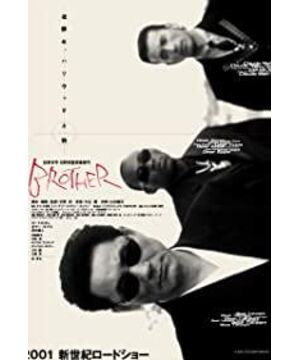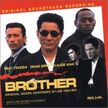·This is not a film review, it is just an over-interpretation of the characters
·Extremely subjective, please click if you don’t agree, LZ does not accept any true behaviors
-------the following text---- ---
"Big Brother" by Takeshi Kitano. The most interesting is the death chain where Yamamoto, Kato, and Shirase are each other's cause and effect-I don't just say this because of MK.
Kato is the first domino. Loyalty is supposed to be an introverted and self-preserving emotion, but Kato's loyalty is somewhat anti-objective, so that in his imagination, "Yamamoto" as the object of loyalty is given a certain meaning that transcends its noumenon. Specifically, when Yamamoto finds a woman, Kato also lamented that "big brother was snatched by such a bitch"-Yamamoto naturally has the right to like any woman, but Kato's "big brother" can't be so bad. The same was true for the subsequent "Shirase Incident". Since I was desperate to follow "Big Brother", "Big Brother" must also be worthy of Shirase's following-how could it not be? In order to prove this, Kato confidently left a sentence "Big Brother, please", the trigger was pulled down, and the blood splashed five steps.
Most viewers attribute the subsequent destruction of the Yamamoto organization to Shirase's bravery and intrepidity. I think Shirase is such a man, I am afraid that he is already dead and has no place to bury him. How can there be a chance to harm Yamamoto? I'm afraid that the fuse is Kato's death. Theoretically, this kind of life-gambling trick has no threat to a normal "economic man", but it works on the hostile Shirase. It's a sigh that when Yamamoto, the "beneficiary" of this incident, had closed his door at first, his reaction was just "of course" and "let's go", so he never cared a little bit. So it was clear-Yamamoto had never been optimistic about the cooperation with Shirase, the harsh conditions and the abrupt attitude were nothing more than a perfunctory attempt to show off his brother's whimsical imagination. Only Kato admitted the whole matter, leaving two strangers behind, and had no time to move the swordsman and had to slash his grudges, but no one was happy about the result.
For Yamamoto, Kato, who was daring with each other, "deathed his place" with wishful thinking and enthusiasm, in exchange for a Shirase whom he didn't know and never wanted, just like an unlucky baby who descended on the blood-stained corpse of his mother-how can it be suffocated? Bumped. Shirase was really involved. When he reached out to the cold-faced Yamamoto, what suddenly appeared in my mind was the scene of Katerina in "Brothers Karamazov" kneeling down in front of Mika after receiving five thousand rubles. I have long felt that the person who can get the trick of Kato will not be a normal "economic man." Perhaps just as he confessed, an old-fashioned Yakuza, for the little reservedness hidden in his veins, can bend his knees with arrogance and hate as a provocation and revenge. Yamamoto is not necessarily aware of this. He spends more and more time living in isolation, always holding intriguing indifference and resistance to Shirase; Shirase responds with numbness and indifference, and the expansion of the organization's power is pathological. Excitement and commitment. So what's the accident with the "folly" of hitting a rock with a pebble? This was originally in Shirase's plan. Kato defeated Shirase by betting his life, so why isn't Shirase betting his life with Yamamoto? Only pitiful subordinates who don't know the truth, they were casually sacrificed.
-------------------------------only about shirase---------------- ---------------In
the scene of Shirase's "surrender", Yamamoto never touched Shirase's outstretched hand in the shot that lasted quite a while, and Shirase never did Put your hands down. The anger also became cold under the cover of sunglasses.
The only time Yamamoto failed to control his emotions, he was furious at Shirase and told him not to smoke that cigar again. Shirase put down the cigar with an indifferent attitude, and immediately after Yamamoto left, he picked it up with an indifferent attitude. Perhaps it was a coincidence—before this scene, Shirase mentioned the dead Kato to Yamamoto.
Shirase distributed his suicide medicine to his subordinates, and when he said "no pain", he almost wore a mischievous smile. Then meaningfully emphasized to Yamamoto, "You and I don't need it, right?" This is the most obvious provocation. No matter how obedient in appearance, the nature of this person is always cruel.
Shirase saw that the head of the killer he had sent was displayed on the pillar in a demonstration. The expression change at that moment is indeed the best annotation for "If I have to die" and "so be it". After all, Kato unintentionally forced him to a dead end, and he premeditatedly planned a grand death.
View more about Brother reviews











